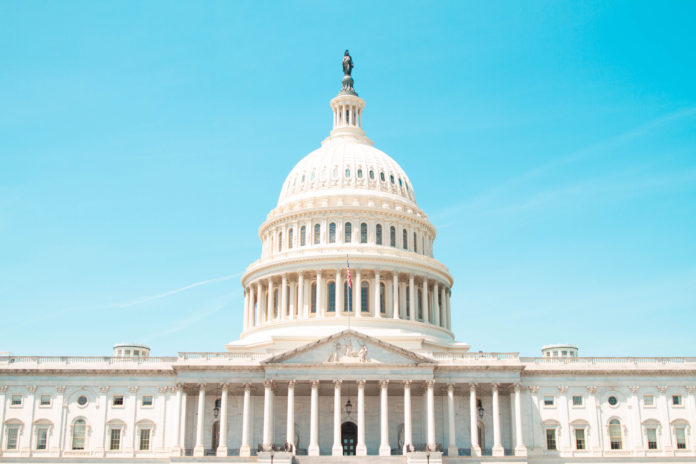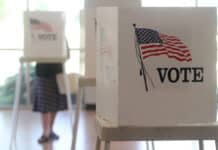(American Greatness) — As the summer comes to a chaotic and tragic close, I can think of many reasons why members of Congress should be called back from their August recess. Putting the federal government in charge of elections would not make the list.
At some point, even the most tuned-out, low-information voters are going to notice that Democrats are behind the fact that vaccine mandates and passports cost them their jobs, that crime has come to their neighborhoods, that gas and food prices have soared, or that they cannot get a doctor’s appointment even if they still have health coverage. Parents will figure out who forced their children to wear masks and get vaccines that are medically inadvisable.
Some of these voters, sadly not all of them, will connect the dots to our nation’s current congressional leadership and plan “to throw the bastards out.” Will they get that chance?
House Speaker Nancy Pelosi has indeed called lawmakers back but only for a brief session— August 23-24. Given the nation’s rapid descent into chaos these last eight months, you would think the speaker planned to protect her majority by changing course, knowing that midterm elections in 2022 are right around the corner. That would be the sane, reasonable thing for an experienced politician like Pelosi to do.
But no, Pelosi is convening the House to use her majority to shove through a federal power grab known as H.R. 4 that will forever rob American citizens of the right to vote under elections laws that make it easy to vote but hard to cheat. And she has the votes to get her way.
What would H.R. 4, also known as the “John Lewis Voting Rights Advancement Act,” actually do?
It puts powerful bureaucrats in Washington and activist litigation groups in charge of vetting, and in effect repealing, the election laws of all 50 states. It creates a presumption that those laws are designed to suppress the votes of blacks and other minorities across the nation. In short, H.R. 4 would make it easy to cheat at the ballot box.
The legislation invokes the once-heroic deeds of Rep. John Lewis. Lewis is no longer here to provide witness for how far our nation has come since he was brutally beaten by a state trooper in Selma, Alabama, as he peacefully demanded the end of Jim Crow laws in states mostly run by Democrats. His suffering led to the quick passage of the 1965 Voting Rights Act, which was championed by Republicans in Congress.
The name of H.R. 4 is ironic because the Democrats are using race and claims of voter suppression as the primary reason for pulling the rug out from under the Constitution, arguing that voter identification and other similar sensible measures passed by state legislatures are racist. As if obtaining identification and voting are beyond the capabilities of blacks as a racial group. Really?
Sadly, if John Lewis were still with us, it is unlikely he would concede anything to the nation that celebrated his service to Georgia in Congress. Like so many so-called civil rights leaders, he betrayed his own stated goals by insisting that the sins of the past are permanent. In exchange, he got to wield the power of the grievance machine that fuels and animates the Democratic Party. Stuck in the past, Lewis refused to give the grace of forgiveness to America even though our nation has moved far beyond 1965.
Ken Blackwell, former secretary of state from Ohio and an expert on election law, has a different take on America as a black conservative. He recently observed:
“Arguing voter ID is a form of voter suppression is a smokescreen designed to muddle the debate. Instead of lecturing us with false arguments, Democrats should listen to Black and Latino voters who support ID requirements because they understand we need to take simple steps to protect the sanctity of the ballot box.
Instead of debating the merits of voter ID and election regulations, liberals label them — and anyone supporting them — as racist in attempts to shut down any debate …
The data doesn’t matter, the views of African Americans and Latinos don’t matter, the actual text of the new law doesn’t matter. The hyperbolic rhetoric ignores the truth.”
Pelosi knows that when enough voters across the country connect the dots between bad policies and the chaos in their lives, they will vote to send her majority packing, so she wants to prevent that by permanently disenfranchising any opposition. Pelosi and her ilk want to be able to stuff the ballot box.
You may recall that Pelosi already championed legislation that would deny states their explicit constitutionally sanctioned role of not just administering elections but also crafting election laws governing both local and federal elections. The bill, which was designated H.R. 1 to signal that it was the Democrats’ top legislative priority, was cynically marketed with the patriotic-sounding name, “For the People Act.”
Article I, Section 4 of the Constitution wisely delegated elections and voting rules to the people through the states, while reserving a supervisory role for Congress.
“The Times, Places and Manner of holding Elections for Senators and Representatives, shall be prescribed in each State by the Legislature thereof; but the Congress may at any time by Law make or alter such Regulations.”
H.R. 1, which passed resoundingly in the House in March, would upend federalism and the Constitution by giving Congress the power to control not just how Americans vote but who counts the vote, by pushing aside the law-making authority of all 50 states. The bill replaced existing state laws with a hard-left approach to voting that would eliminate popular laws such as voter ID while requiring risky behavior like third-party ballot harvesting of absentee ballots over months of “early voting.”
H.R. 4 is an attempt to accomplish the same bad policy goals of H.R. 1 but by different means. Instead of giving Congress the power to run elections and rewrite voting rules for the nation, H.R. 4 empowers career lawyers at the Department of Justice and other actors who are not accountable to the people to vet state voting laws through a process called “preclearance.”
So for example, if my state of Minnesota ever manages to reinstate voter ID, or outlaws ballot boxes, those laws would be treated as immediately suspect, triggering a Justice Department preclearance review, and attract easy-to-win lawsuits from activist groups on the Left.
Preclearance was created by Congress in 1965 to root out Jim Crow laws in mostly Democratic states and counties. Since that time, the Supreme Court has recognized that states like Georgia have moved on from the days of Jim Crow, sending blacks like John Lewis to Congress and electing blacks to run cities like Atlanta.
Pelosi and Senate Majority Leader Chuck Schumer fought hard to make H.R. 1 the law of the land, and in theory had the votes to send it to the desk of Joe Biden for his signature earlier this summer.
But Sen. Joe Manchin rejected the radical nature of H.R. 1 and the underlying idea that states were not trustworthy partners when it comes to protecting the right to vote. Manchin stood his ground, quietly cheered on by colleagues who were too cowardly to stand firmly with him to defeat H.R. 1.
But as I noted in June, Manchin, who was secretary of state and governor of West Virginia before getting elected to Congress, has signaled all along that he would support “compromise” voting rights legislation. He has an outline for H.R. 4 that, for example, preserves voter ID but permits voters to identify themselves with alternatives to a state-issued photo ID (e.g. a utility bill or lease).
Manchin has called for reducing the power of the attorney general over elections and raising the bar for activist organizations making claims of voter suppression. But Pelosi’s just-released version of H.R. 4, which is expected to pass, rejects Manchin’s more measured approach, emphasizing again the empowerment of the feds and professional litigants.
H.R. 4 as written not only rolls the nation back to the racial divisions of 1965, it denies who we are now as Americans and all that we have achieved to advance and protect the voting rights of all citizens. The American people today include blacks and other minorities who overwhelmingly favor sensible measures like voter ID and love our constitutional republic.
Put simply, H.R. 4 is premised on a dangerous lie designed to end self-governance and permanently divide us as a nation. It asserts a distorted version of America and hides its ugly motives behind the soaring rhetoric of patriotism and voting rights.
Let’s pray that when H.R. 4 reaches the U.S. Senate this fall, Manchin will once again pull our country back from the abyss of a federally enforced voting regime that makes it easy to vote, and even easier to cheat.
Kim Crockett
Kim Crockett is a lawyer and voting rights advocate. She teaches election integrity workshops for American Majority, is a legal policy advisor to Minnesota Voters Alliance (MVA) and Chairman of For Kids & Country, which exposes how the teachers’ unions brought cultural Marxism into our schools and civic arena. Kim loves doing talk radio and regularly contributes to local and national forums including Intellectual Takeout, Alpha News, American Greatness and The Minneapolis Star Tribune.

















